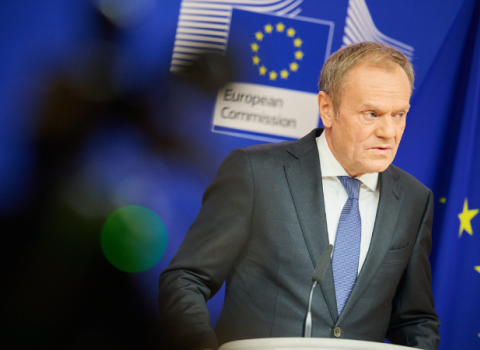The debate in Germany about increasing military research funding is becoming more concrete. A commission of research experts, as well as ministers Bettina Stark-Watzinger and Robert Habeck, have called for stronger support for defense innovation

Bettina Stark-Watzinger, German Federal Minister for Education and Research. Photo credit: Picture Alliance for DLD / Hubert Burda Media
In the debate over more funding for military research, underlying assumptions often go unexamined, and concrete measures are rarely specified. Economy Minister Robert Habeck has warned that Germany has “disarmed” in research and innovation, while the Ministry of Education and Research (BMBF) and the Commission of Experts for Research and Innovation (EFI) speak of untapped spillover effects that could arise from better collaboration between civil and military research.
However, expert interviews by Table.Briefings show that the situation is far more complex than is often presented. The effects of investment in military research are unclear and it is not always possible to draw a clear line between civilian and military research in practice.
Military and dual-use research in Germany is not only conducted in the German Armed Forces' Military, Scientific and Technical Institutes. Direct research funding from the Ministry of Defence (BMVg) also goes to institutions like the German Aerospace Centre, Fraunhofer Institutes and universities. Research funds from the defence ministry also flow to the Agency for Innovation in Cybersecurity, which then awards research contracts to universities and research institutions.
Other ministries apart from the BMVg also provide dual-use funding. Although the BMBF's security research focuses on civilian applications, insiders report that companies with a military interest in the resulting innovations are also involved. And in principle, the Federal Agency for Disruptive Innovation (Sprind) also funds more than just civilian projects.
There should be no lack of coordination between different ministries on dual use funding, because there’s also an Interministerial Committee for Science and Research (IMC), chaired by the BMBF and including other ministries' research officers.
When it comes to implementation at universities, civil clauses – explicit bans on defence-related projects - are generally not an obstacle, at least in the dual-use sector, according to physicist and peace researcher Jürgen Altmann from the Technical University of Dortmund.
Not all universities have such a clause, and some are flexible enough to be compatible with some military or militarily motivated research, he says.
Defence R&D budget barely funds research
However, the BMBF continues to refuse to fund military research, a spokesperson confirmed to Table.Briefings. Meanwhile, the BMVg has around €2 billion at its disposal for military research and development, about €1 billion more than ten years ago. Still, experts point out that most of this budget is channeled into development, for instance, of the Eurofighter fighter jet. Only a fraction goes towards research.
Ultimately, however, most areas are dual-use research anyway. With artificial intelligence, cybersecurity and similar topics playing an increasingly important role, the lines between civilian and military applications become increasingly blurred. "It's not about tanks; otherwise, it would be clear," says one expert. Therefore, the BMVg in particular believes such research should not be funded from the defence budget.
The German situation is different from the often-mentioned Defense Advanced Research Projects Agency (Darpa) in the US. There, the money comes from the abundant US defense budget. However, as Michael Brzoska from the Institute for Peace Research and Security Policy at the University of Hamburg points out, this money is used to fund dual-use research, which primarily benefits civilian applications.
Merging Sprind and cybersecurity agency
Uwe Cantner, chair of the EFI, says Germany doesn’t have to set up an agency like Darpa. Instead, he could imagine merging Sprind and the Agency for Innovation in Cybersecurity, which the interior and defence ministries jointly fund. Both have similar tasks and are located close to each other. This merger was recently demanded by the conservative opposition during a parliamentary debate on an act that grants more freedom to Sprind. He also envisages opening up the proposed new German Agency for Transfer and Innovation not only to social innovations, but also to military R&D, particularly for dual-use.
For Cantner, the situation is clear. "Since the Zeitenwende, there has been no alternative to more military research – anything else does not fit the situation." He says the goal is to implement this now as cleverly as possible and utilise the spillover effects into the civilian sector.
However, there is considerable debate about the extent of these so-called spillover effects. A number of thorough studies have revealed positive effects – two of which the EFI report cites. However, other studies are more skeptical. The general problem is that the results of the studies, conducted mainly in the US and the UK, might not be applicable to Germany, where R&D funding and framework conditions differ.
The BMBF has no concrete proposals
The BMBF has not yet made any statements about concrete measures on dual use research. It is understood that the science minister's initiative caught her own ministry off guard. Responsibilities are now being clarified in a hurry.
Funding guidelines should now be reviewed for dual-use potential and amended if necessary, but this is not happening. It remains unclear whether the minister is simply trying to raise her profile or whether – given Germany's empty coffers – she has her eyes on the German Armed Forces' €100 billion special fund to fund research.
Ruppert Stüwe, a Social Democratic Party (SPD) MP who focuses on research, however warns against rash measures. He says, "there is no need for quick fixes, but rather ethical standards and a precise consideration of the risks and consequences. Research for the military is no ordinary source of funding like any other and should continue to be kept separate from civilian research, for funders and potential users alike," the SPD politician writes on LinkedIn. However, he could not say whether this was the unanimous position of the SPD, currently part of Germany’s ruling coalition government.




 Follow where the public and private R&I money is going and which collaborative opportunities you can pursue.
Follow where the public and private R&I money is going and which collaborative opportunities you can pursue.